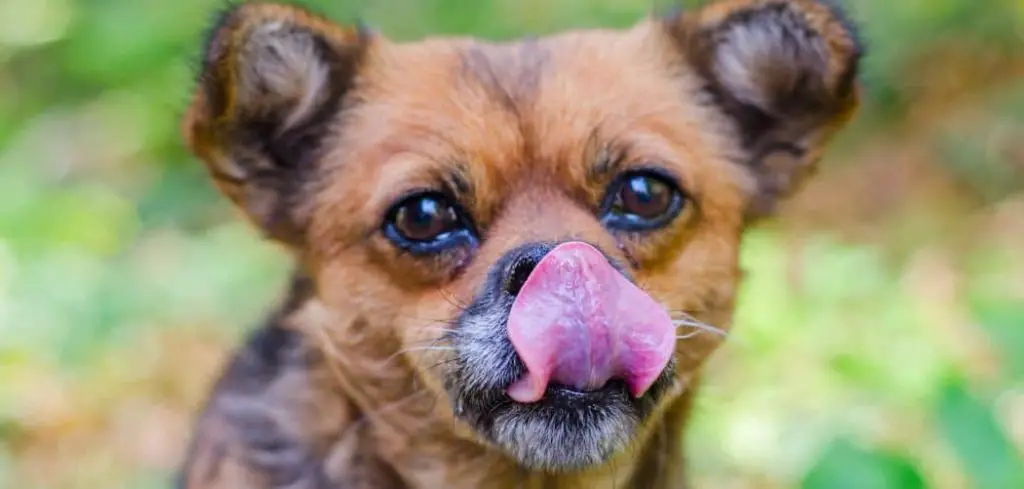If your dog is constantly licking their nose, you might be left wondering if it’s just a quirky habit or a sign of something more serious.
While occasional nose licking is normal in dogs, excessive licking can point to underlying issues that need attention.
We outline the common causes of a dog excessively licking their nose, what you can do at home, and when to seek veterinary help.
Table of Contents
Dog Excessively Licking Nose — Why It Happens
A dog excessively licking their nose can be due to many reasons, and while some are harmless, others may indicate discomfort or illness. Common causes include nasal irritation, allergies, anxiety, dental issues, or even neurological problems. Sometimes, a dog may lick excessively due to nausea or a foreign object stuck in the nose.
It’s important to consider how long it’s been happening and if other symptoms—like sneezing, discharge, or appetite loss—are also present.

Dog Excessively Licking Nose: Common Causes
Nasal Irritation or Foreign Body
A dog may lick their nose persistently if there’s something irritating it, such as dust, pollen, or a small object like a grass seed. The nose is a sensitive area, and even a minor irritant can lead to excessive licking as the dog tries to soothe or dislodge it.
You might notice sneezing, pawing at the face, or a runny nose.
Left unaddressed, this irritation can lead to infection or nosebleeds. If you suspect a foreign object or chronic irritation, a vet visit is recommended.
Related: Dog licking excessively (Here’s why)
Allergies
Just like humans, dogs can suffer from seasonal, food, or environmental allergies. These often lead to itchy skin and inflamed nasal passages.
Dogs with allergies may lick their nose constantly as a response to the itchiness or postnasal drip.
Other signs to watch for include red, watery eyes, sneezing, or inflamed skin around the muzzle. Treating the underlying allergy usually helps reduce the licking.
Nausea or Gastrointestinal Upset
Excessive nose licking can be a subtle sign of nausea in dogs. When a dog feels queasy, they often lick their nose or lips repeatedly.
This might occur before vomiting or in conjunction with eating grass, drooling, or a decreased appetite.
In some cases, nausea may be related to an underlying gastrointestinal issue or toxin exposure, which requires prompt veterinary attention.
Dental or Oral Pain
If your dog is experiencing pain in their mouth—such as from a broken tooth, gum infection, or foreign object—they may excessively lick their nose as a coping mechanism.
Dogs often use nose licking to relieve discomfort that they can’t scratch or reach otherwise.
You might also see signs like bad breath, difficulty eating, or drooling. Dental problems can be serious, so a thorough oral exam is important.
Anxiety or Compulsive Behavior
Nose licking can also be behavioral, especially in dogs with anxiety or obsessive-compulsive tendencies.
If your dog licks their nose when stressed, nervous, or bored, it could be a self-soothing action.
This type of licking usually occurs during certain situations—like car rides, loud noises, or being left alone. Chronic anxiety or compulsive behaviors may need behavioral intervention or calming aids.
Neurological Disorders
In rare cases, excessive nose licking may stem from a neurological issue such as focal seizures or nerve dysfunction.
These symptoms might be subtle and mistaken for normal behaviors.
If the licking is rhythmic, constant, and occurs alongside other odd behaviors like staring into space, head tilting, or sudden uncoordination, a neurological evaluation may be necessary.
What to Do If Your Dog Is Excessively Licking Their Nose
Start by observing the pattern. If your dog’s nose licking is occasional and not accompanied by other symptoms, it may not be a cause for concern.
However, if it’s persistent, worsening, or paired with signs like sneezing, discharge, vomiting, or behavior changes, it’s best to investigate further.
At home, gently inspect your dog’s nose and mouth for visible irritants or injury. Avoid sticking anything into the nostrils. You can wipe their nose with a damp cloth to remove allergens or debris.
If you suspect dry air or environmental triggers, consider using a humidifier and minimizing exposure to known allergens.
For anxiety-related licking, ensure your dog has enrichment activities, a consistent routine, and safe spaces. Calming supplements or pheromone diffusers may also help.
And always ensure your dog is drinking water and eating normally—appetite changes could signal something more serious.
When to Call or Visit Your Vet
Persistent nose licking that doesn’t improve in a day or two should prompt a vet visit.
Seek veterinary care immediately if your dog:
Has nasal discharge, especially if it’s thick, yellow, or bloody
Is vomiting, drooling, or refusing food
Shows signs of oral pain or swelling
Displays unusual behaviors, tremors, or unsteadiness
Seems distressed, lethargic, or suddenly anxious
These symptoms could indicate infection, a foreign object, gastrointestinal distress, or neurological problems.
Early evaluation can help prevent complications and ease your dog’s discomfort quickly.
Read more: Dog Excessively Licking Carpet (What it means)
Key Takeaway
Excessive nose licking in dogs isn’t always a simple habit—it can signal discomfort, illness, or emotional distress.
By monitoring your dog closely and responding to concerning symptoms early, you can help identify the root cause and get the right treatment.
Whether it’s an allergy, dental issue, or just a quirky stress response, your vet can guide you toward the best solution to keep your dog healthy and comfortable.
